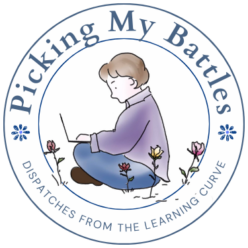
When my parents casually extended the offer to watch the kids last night, we jumped on it (I can count on one hand the number childless events we’ve attended since we became parents). My parents make this offer to us and to my sister each time we visit them in Michigan, and Grandkid-sitting has become something of a ritual. Grandma and Grandpa make something special for the kids, and then for dessert they commune over blueberry crisp in front of a movie.
My mom and I made made a mother-daughter day of the preparations as we went to the grocery store and the farmer’s market together. Our last stop was at the library to pick up the movie.This small-town library does not have the largest selection, but the real challenge in any selection is finding a movie that’s appropriate for both a five-year-old and a twelve-year-old.
“What about Cars?” Mom asked.
“They’ve seen it,” I answered. “Have you already seen that one?” I pointed to another DVD. She and Dad had with our neice and nephew. The next one had too many things I’m not prepared to explain to either child. The next was too violent – my twelve-year-old has suddenly developed an extreme aversion to that in his movies. Then my eye fell on “Charlotte’s Web”. I knew it had a sad ending, but a good one – for adults, and in a way I’d just discovered, for children too.
We had recently downloaded another movie with a sad ending – Iron Giant. The movie centers around a boy who befriends a seven-story robot. At the climax of this animated feature, the robot sacrifices itself for the sake of the boy. The sacrifice is not graphically portrayed, but my five-year-old instantly understood that the robot had died, and burst into tears.
Nobody likes to see their child unhappy, but when we had finished the first round of tears and hugs, we talked. We talked about the giant, about what and why people do extraordinary things for others. We talked about loyalty and real-life sacrifices people make for each other everyday. And as we talked – and cried a little more – we connected with each other on a different level and he connected with the world in a new way. It was not a happy ending, but it was a good ending.
Remembering that last good ending, I picked up Charlotte’s Web, only to find that the DVD was not in the case. I resumed the search as finding something acceptable once again trumped the quest for something truly good.

